|
February 17, 2021 - No. 7
The Fight for Status for All
Permanent Resident Program for Refugee
Claimants Dismally Fails Migrant Workers

• Who
Can Apply for Permanent Residence Status Under
the Immigration Department's "Special
Measures?"
Honduras
• Mass Migration, a
Post-COVID-19 Legacy - Javier Suazo
The Fight for Status for All

Immigration, Refugees and Citizenship Canada
(IRCC) is now accepting applications for its
"special measures for refugee claimants working
in health care during the pandemic." People can
apply until August 31, 2021.
This program was put in place after Quebec
Premier François Legault's declaration on May
25, 2020 that he would consider allowing refugee
claimants working in Quebec long-term care
facilities during the pandemic to permanently
settle in Quebec. The program was officially
announced in August and the IRCC started
accepting applications on December 14, 2020.
The temporary program allows certain refugee
claimants, only those who "provide direct care
to patients" during the COVID-19 pandemic, to
apply for permanent resident (PR) status. It
also permits applications from spouses and
common-law partners of eligible asylum seekers
who contracted COVID-19 and died, if the
applicants are in Canada and arrived before
August 14, 2020.
According to Federal Immigration Minister Marco
Mendicino this temporary program is to recognize
"the dedication of the many asylum seekers who
have raised their hands to serve as we live
through a unique and unprecedented situation."
Under the Canada-Quebec Accord the Quebec
government has sole responsibility for deciding
who will become permanent residents so the
federal government has developed two temporary
policies, one for people living in Quebec and
another for those residing outside of Quebec. It
is estimated that most of the eligible workers
are in Quebec.
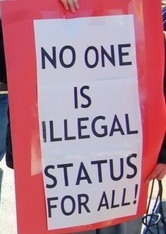 Applicants
residing in Quebec must first submit an
application for permanent resident status to
Immigration, Refugees and Citizenship Canada
(IRCC). If they qualify under the federal
requirements, the Quebec Ministry of
Immigration, Francization and Integration (MIDI)
must then validate whether they also meet the
requirements under its special program. If they
do the MIDI issues a Quebec Selection
Certificate (CSQ) and the IRCC grants permanent
resident status. Applicants
residing in Quebec must first submit an
application for permanent resident status to
Immigration, Refugees and Citizenship Canada
(IRCC). If they qualify under the federal
requirements, the Quebec Ministry of
Immigration, Francization and Integration (MIDI)
must then validate whether they also meet the
requirements under its special program. If they
do the MIDI issues a Quebec Selection
Certificate (CSQ) and the IRCC grants permanent
resident status.
Quebec's Immigration Minister, Nadine Girault,
said that the purpose of the special program "is
to recognize the exceptional contribution of
asylum seekers who worked on the front line,
with people who were sick and with our seniors,
during the first wave of the health crisis," and
allow them to "continue their essential
contribution to health care and integrate fully
into Quebec society."
Those eligible for the "special measures"
represent a small fraction of the thousands of
asylum seekers who worked, and continue to work,
providing essential services in health care as
cooks, cleaners, and in other positions that do
not provide "direct care to patients," as well
as those working in other economic sectors.
These workers are not recognized for their
sacrifice and contribution to keeping society
functioning and safe, and are not eligible for
the program.

In a news release and backgrounder issued on
December 9 by Immigration, Refugees and
Citizenship Canada, the criteria for granting
permanent resident status to certain asylum
seekers is laid out.[1]
The news release states:
"Among other criteria, individuals eligible for
consideration under these public policies must:
- be a refugee claimant, with either a failed
or pending refugee claim, who claimed asylum
before March 13, 2020, and continued to reside
in Canada when their application for permanent
residence under this public policy was made;
- have been issued a work permit after they
made their refugee claim;
- have worked in a designated occupation
providing direct patient care: in a hospital,
public or private long-term care home or
assisted living facility, or for an
organization/agency providing home or
residential health care to seniors and persons
with disabilities in private homes;
- have a Quebec Selection Certificate, if
wishing to reside in Quebec; and
- meet existing admissibility requirements,
including those related to criminality, security
and health.
"Some refugee claimants would be excluded from
applying, including those who have been found
ineligible to have their refugee claim referred
to the Immigration and Refugee Board of Canada,
or who have withdrawn or abandoned their
claims."
Applicants must advise the Immigration and
Refugee Board (IRB) that they have applied, so
that any pending refugee claim can be placed on
hold. Once IRCC confirms their eligibility and
that they have the required work experience, any
removal order they are under will be stayed
until a final decision on their application is
made.
The pending or failed refugee claimant must
also have been authorized to work in Canada by
virtue of a work permit "unless the individual
lost their authorization to work as a result of
a removal order against them becoming
enforceable due to a final negative decision of
their refugee claim, in which case work
performed subsequent to the loss of that
authorization need not be authorized." In other
words, if someone lost their work permit after a
removal order was issued against them and
nonetheless continued to work to ensure their
survival, they may apply for the program.
However, if they are rejected, it leaves them
without any recourse and at risk of immediate
removal from Canada.
If applying for permanent resident status under
these "special measures" anyone who has received
a final negative decision from the IRB and has
"commenced an application for leave and judicial
review of the negative IRB decision in Federal
Court, or an appeal in relation to the
underlying IRB decision at the Federal Court of
Appeal" must withdraw their claim at the IRB or
their appeal of the negative decision "in order
to be granted permanent residence through the
public policy." Should they not withdraw, "those
processes will continue to proceed but their
application for permanent residence under this
public policy will be refused."
Persons not eligible include: "Persons whose
refugee claims were: determined to be ineligible
to be referred to the IRB; determined to be
withdrawn (unless withdrawn immediately prior to
being granted permanent resident status through
this public policy) or determined to be
abandoned; determined to be manifestly unfounded
(MUC) or with no credible basis (NCB);
determined to be excluded under Article 1F of
the Refugee Convention; or a determination that
refugee protection has been ceased or vacated
are not eligible for this public policy."
1. "IRCC
announces
opening date of special measures for refugee
claimants working in health care during the
pandemic," Immigration, Refugees and
Citizenship Canada, December 9, 2020

Honduras
- Javier Suazo -
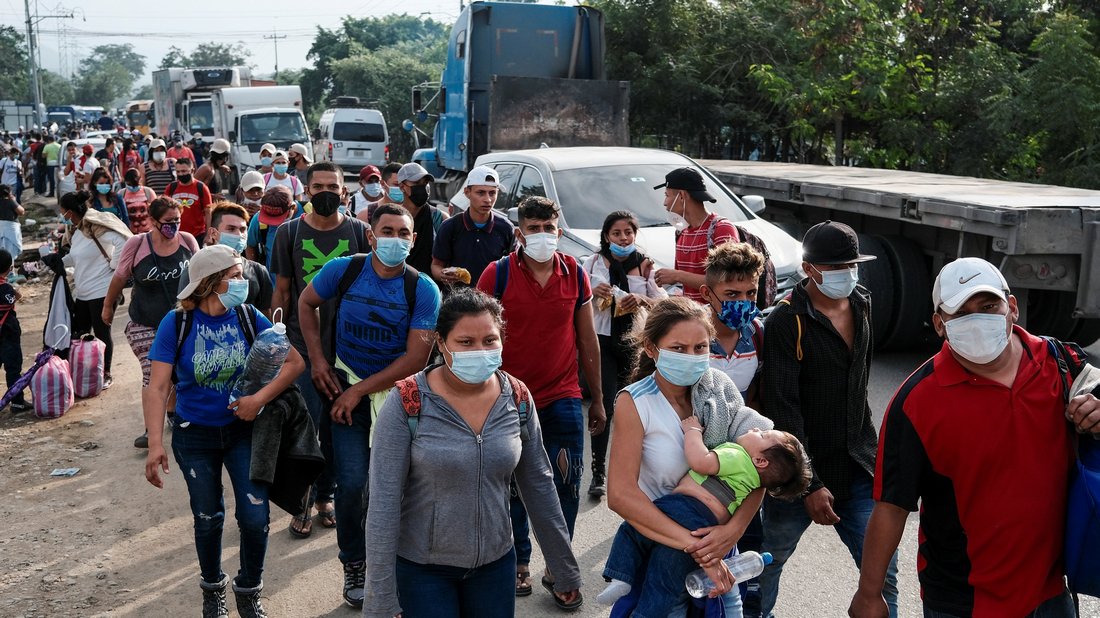
January, 2021. Caravan of Honduran migrants
travels through Guatemala.
"Trump's response
has been to enact draconian immigration
policies that seek to repeal our asylum and
refugee laws, along with severe reductions in
our
foreign assistance to the region." -- Joe
Biden
In the agrarian reform programs of the '70s
and part of the '80s, internal migration was
part of State policy for the organization and
training of peasant farmers, in order for them
to access good quality productive, uncultivated
land in the possession of large landowners. As
well, there was a strategy of transferring
peasant families from less developed areas to
those with greater potential, although part of
the promised land was State-owned.
These policies and actions had, on the one
hand, the support of international cooperation,
which provided food and clothing to "migrant"
peasants, as well as of the State itself, with
programs to provide technical assistance, credit
and tools. But these programs were also
supported by multilateral banks for the
execution of agricultural development projects,
sustained through the export of crops such as
bananas, cashews, cotton and citrus fruits, with
transnational companies and local intermediaries
controlling the commercialization of the
products as a way of transferring the risks of
production to the farmers and government
themselves.
It has not been the same with migrations
outside the country, where although the risk is
borne by individual migrants and families (today
they seek the American dream -- the father,
mother, children and other relatives), this has
expanded after the political crisis generated by
the coup d'état in June 2009. Before that, in
general, external migration was voluntary and
spontaneous. People who managed to cross the
border between Mexico and the U.S. sent money to
their relatives to set out, or hired a "coyote"
to help them on their route to the north. Some
of them stayed working in Guatemala or Mexico,
to accumulate the money to guarantee a safe
journey, others simply returned, or were
deported by the Mexican or gringo
immigration authorities.
Today migration to the U.S. has become
complicated. On the one hand, the paralysis and
abandonment of the agrarian reform programs led
to the expulsion of the peasant population from
the countryside to the city, and eliminated the
induced migration programs supported by the
State and international cooperation. Along with
this came increased concentration of ownership
and rural precariousness, which translated into
greater poverty and food insecurity. Since the
'90s, the fashionable programs have been
Conditional Cash Transfers and food aid, putting
the country deeper into debt and using the
surplus of basic grains that U.S. producers
"subsidized" by the State cannot sell in their
regional market, negatively impacting local
production.
This was further complicated by the deepening
of orthodox economic stabilization and
structural adjustment policies and programs
supported by the International Monetary Fund
(IMF) and World Bank, resulting in the
contraction of State spending, hurting peasants
involved in domestic agriculture. All of this
has added to greater concentration of property
ownership and dispossession of natural resources
and biodiversity from the communities. Contrary
to what was intended by their design, these
policies have generated greater migration, but
also less economic and social protection for
vulnerable and poor families.
COVID-19 and natural phenomena such as
hurricanes Eta and Iota have made this situation
of inequality and the lack of opportunities more
visible for rural families, and is now also
affecting mostly young people in populated
centres, where jobs are a rare commodity, and
violence, drug trafficking and corruption
directly involve the government.
The government and politicians' discourse is
that migrants are the problem, so it is
necessary to try by all possible means to get
them to refrain from migrating, although in
reality it is a human right. A father of a
family who lost his land for not paying his
debts to the bank because the harvest was lost,
who, in the city was fired from his precarious
job due to the lockdown and avoiding contagion
with COVID-19, then had his house destroyed by
Eta, has few options to feed his family and
survive, so the closest thing at hand is
migration or death.
The government of the Republic hopes that
things will return to "normality," as it existed
before COVID-19, but with policies that promote
the concentration of rural property ownership,
the destruction of natural resources, economic
and social exclusion due to the lack of
large-scale popular housing programs, access to
education, health and sustainable jobs organized
by the State, this normality is not like that;
rather it was and will be an exclusionary
normality.
Donald Trump's policy, accepted without any
fuss by the governments of Honduras, Guatemala
and Mexico, also made it possible, in practice,
for migration to be criminalized as an offence,
despite the discourse of public officials and
police that it is and continues to be a human
right. These countries became an extension of
the migra
gringa, [the U.S. Immigration and
Customs Enforcement agency] since their police
forces are responsible for persecuting the
migrants. They are organized and held in public
centres (which some call cages) or in social
centres, waiting for their asylum application to
be processed, which does not arrive; but others
are simply deported and separated from their
children, without having processed their request
through the authorities of a safe country, be
that Guatemala or Mexico.
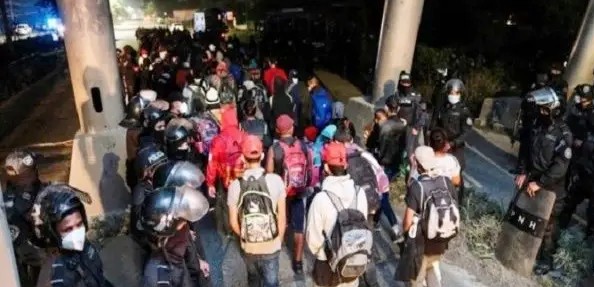
January 14, 2021. Migrants leave San Pedro
Sula, Honduras heading north.
On January 14, 2021, a new migrant caravan left
San Pedro Sula, the industrial capital of
Honduras, some 3,000 people according to
official figures, concentrating more than 6,000
people on the border with Guatemala on Sunday,
January 17 (new caravans were added on the
weekend), according to data reported in the
non-monopoly press, that included children, but
also older adults, pregnant women and disabled
people. The Honduran Police, instead of
encouraging them to continue and wishing them
good luck, tell them to watch out for the migra of
Guatemala and Mexico, and to forget about
getting to the U.S. border. In addition to
personal papers (identity and children's birth
certificates), a COVID-19 test is required to
enter Guatemala, as those who do not comply will
be deported.
The mobilization of Guatemalan police and
military to the border with Honduras has been
dramatic, as with the Mexican police to the
border with Guatemala, where the slogan is No Pasarán,
like the commitment made to Donald Trump when
they accepted to operate as "safe countries" for
migrants. The press talks about Hondurans being
deported before they enter Guatemala, that is,
by Customs and associated officials, but the
migrants do not plan to return and are facing
the police and the military, hoping to get past
some 20 security cordons between the border with
Guatemala and Mexico.
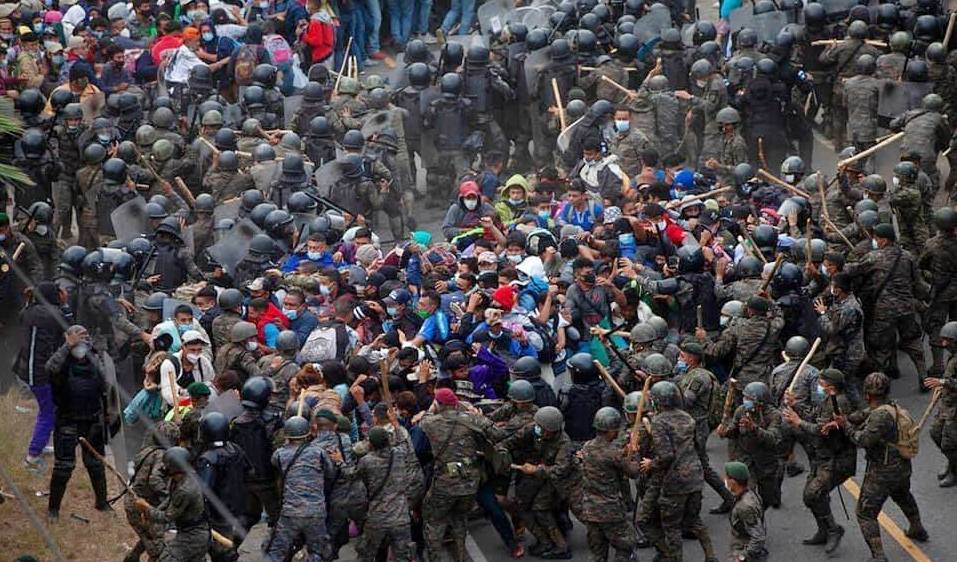
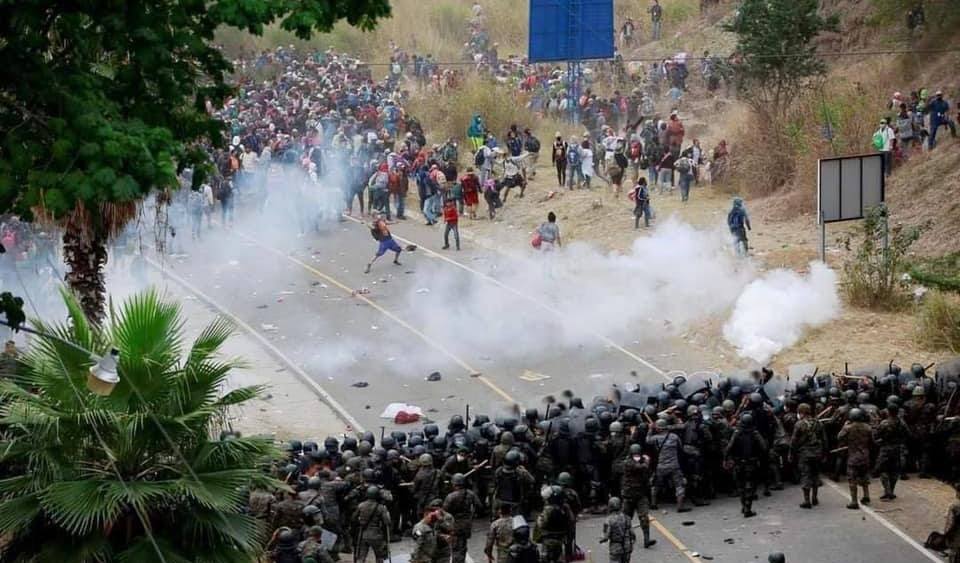
January 17, 2021. Migrants brutally attacked by
Guatemalan police and military.
The deportees will be registered by the
Honduran authorities, since there is an
Executive Decree No. PCM-033-2014 that declares
a humanitarian emergency due to mass migrations
and obliges the government to activate the
social protection system whose main policy is
the Conditional Cash Transfers and food aid,
added to temporary and poor-quality employment
when there are resources and projects that
require, for the most part, unskilled labour.
Likewise, centres for the care of children and
migrant families are supposed to be activated,
but there is no guarantee of an effective
reintegration into the labour market, or to
schools and homes.
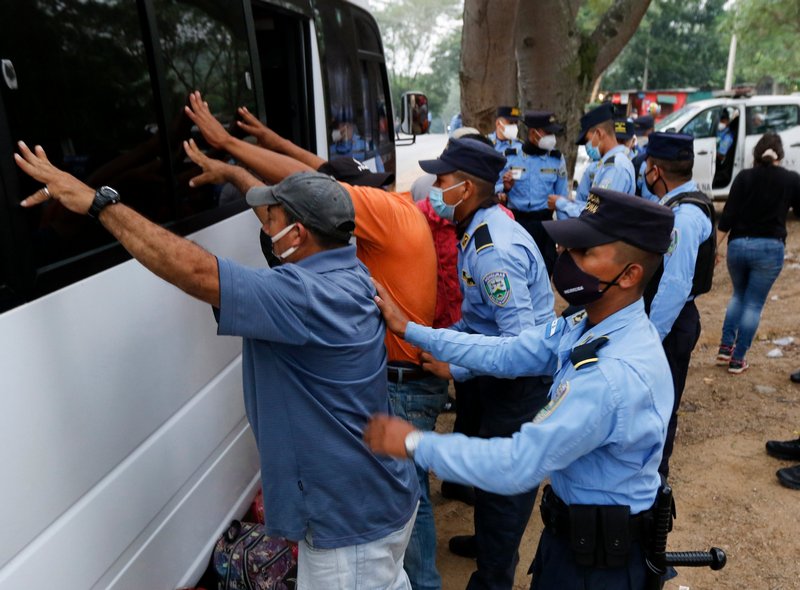 
Migrants face Guatemalan police.
Figures from the National Migration Institute
(INM) of Honduras show that in 2020, there were
43,757 Hondurans deported from the United
States, Mexico and Guatemala, of which 10,484
were minors. A curious fact, the largest number
of deportees are from Mexico, not the U.S.,
which shows that Trump's policy has been
effective, although the costs are borne by the
safe country, in this case Mexico.
The migration of Hondurans is taking place
within days of Joe Biden's inauguration as
President of the United States. In the
imagination of the migrants, there is hope that
the new occupant of the White House will relax
or eliminate the policies, actions and laws
approved by the Trump administration, which at
the end of its mandate has dedicated itself to
obstructing the incoming government's actions
and delaying the coming into effect of new laws.
Likewise, they are betting on Biden keeping his
campaign promise to grant residency to the
largest possible number of Latin Americans
living in the U.S. There are also demands that
children not be separated, and that those who
are unaccompanied be given due protection and be
reunited, eliminating Trump's so-called "zero"
tolerance.
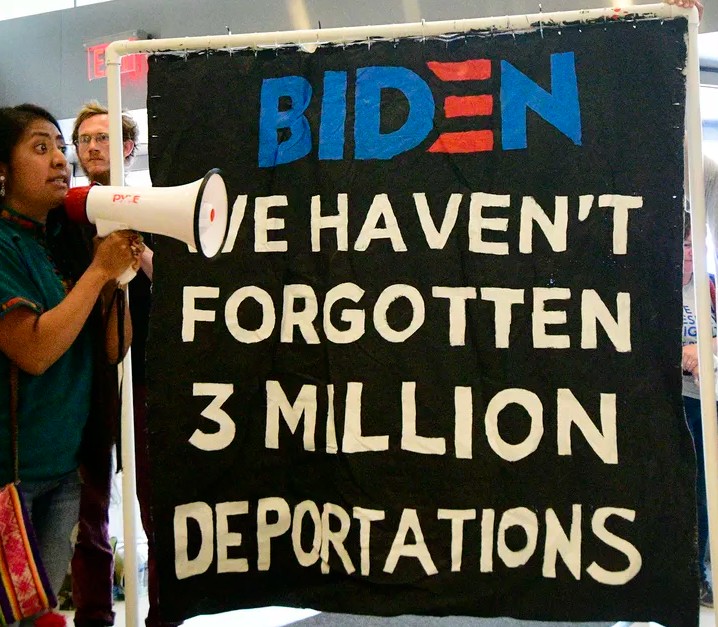 It is hoped that
Biden will resume the initiative of the Plan for
the Alliance of the Northern Triangle of Central
America (Guatemala, El Salvador, Honduras) that
he led when he was vice president in the Obama
administration, but which was discontinued or
remained on paper, as it was a government that
specialized in deportations. This plan had a
budget of $750 million to accelerate the
necessary reforms in the region, focused on
fighting organized crime, reducing poverty and
strengthening public institutions contaminated
with the virus of corruption and inefficiency.
One problem, in addition to Trump's freezing of
funds, was trusting leaders and governments
contaminated with corruption and in collusion
with organized crime. It is hoped that
Biden will resume the initiative of the Plan for
the Alliance of the Northern Triangle of Central
America (Guatemala, El Salvador, Honduras) that
he led when he was vice president in the Obama
administration, but which was discontinued or
remained on paper, as it was a government that
specialized in deportations. This plan had a
budget of $750 million to accelerate the
necessary reforms in the region, focused on
fighting organized crime, reducing poverty and
strengthening public institutions contaminated
with the virus of corruption and inefficiency.
One problem, in addition to Trump's freezing of
funds, was trusting leaders and governments
contaminated with corruption and in collusion
with organized crime.
This initiative was taken up by Mexico with the
support of the Economic Commission for Latin
America (ECLAC), when formulating and approving
the Comprehensive Development Plan for El
Salvador, Honduras, Guatemala and Mexico, but
the Central American governments and migrant
support organizations are still waiting for
financial resources in the amounts promised. In
addition, although it had the support of the
United Nations and the EU, this plan was born
lame, since it runs counter to Donald Trump's
policy for the region, who even developed an
agenda parallel to the Plan's proposals. As
well, it is based on governments and political
leaders under investigation for acts of
corruption and accused of having links with drug
trafficking. It is expected that with Biden the
work agenda of the Plan will be resumed, but
ECLAC should adjust its proposals and look to
foster a more benign approach to the all-round
development of the countries, consulting the
people and their supporting organizations.
Within Honduras, the evidence shows that the
policies and laws in support of migrants do not
work, given that the economic, agricultural and
social policy implemented since the coup d'état
is exclusionary by definition, with a failed
economic model accepted as valid. This extends
to the actions of the National Commissioner for
Human Rights, with the Human Security Strategy
for Local Development, which is seen as a
palliative for the policy of centralized power
and the systematic violation of human rights,
that has little impact on the quality of life of
families in the municipalities and the demand
for citizens' rights.
Choluteca, Honduras, January 17, 2021

(To access articles
individually click on the black headline.)
PDF
PREVIOUS ISSUES
| HOME
Website: www.cpcml.ca
Email: office@cpcml.ca
|

